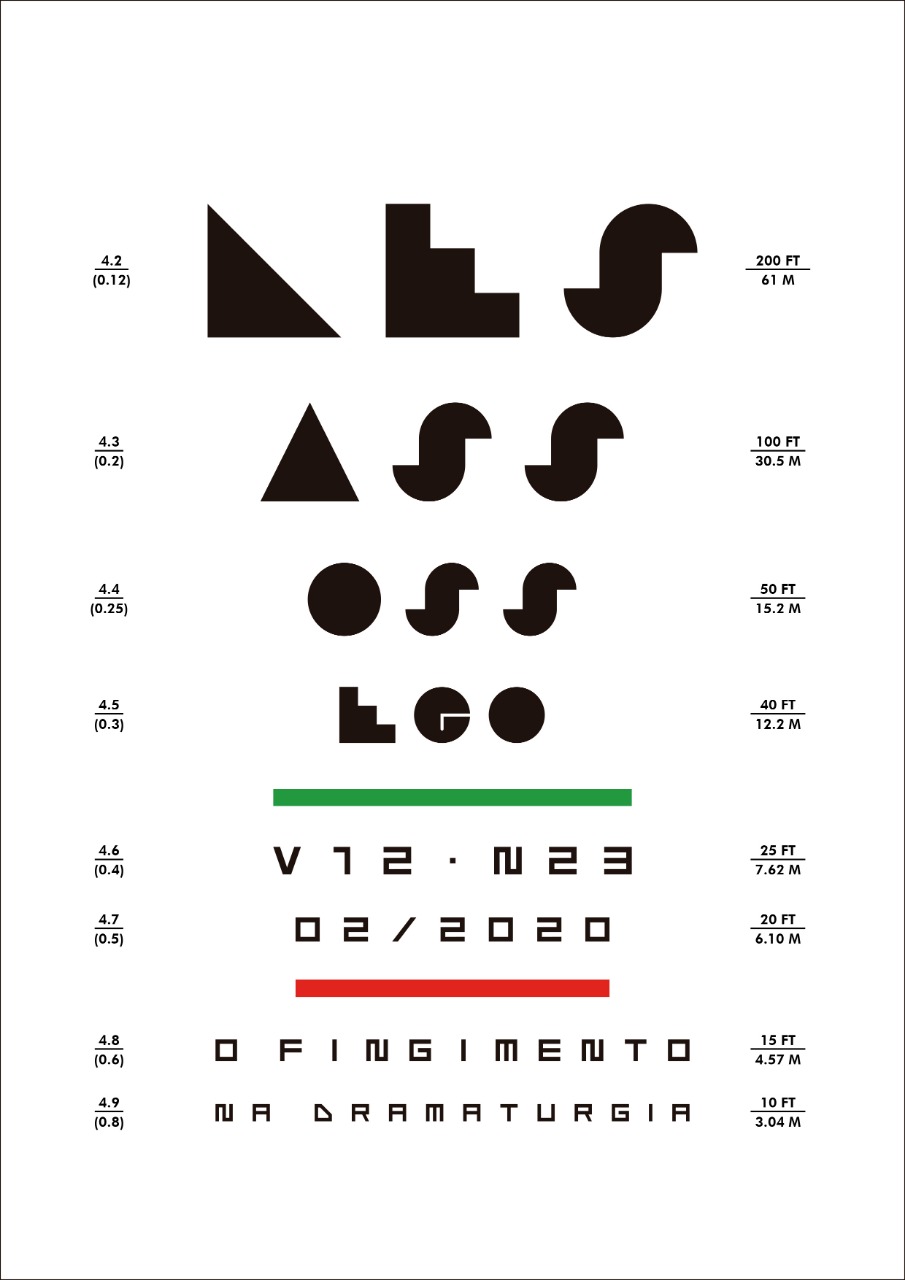Psychology and Psychiatry in Bernardo Santareno: observe to tell; narrating to treat
DOI:
https://doi.org/10.11606/issn.2175-3180.v12i23p99-116Keywords:
Bernardo Santareno, Psychology and Psychiatry, New StateAbstract
According to the Aurélio dictionary, Psychology is part of Philosophy that deals with the soul, its manifestations and psychic phenomena. Psychiatry is presented by him as the doctrine of mental illness and its treatment. Psychology takes care of people's social and behavioral aspects. Psychiatry takes care of the physiological and chemical aspects involving the human brain. In In the seas at the end of the world (1959) and O Lugre (1959), Bernardo Santareno, a psychologist, is concerned with discovering the causes of the problems suffered by seafarers, using social, philosophical and behavioral knowledge as the main tool. Here, the individual is analyzed in the context in which he lives, with the author proposing to identify and treat psychological and behavioral changes through conversational techniques, in addition to helping to prevent them. In turn, in relation to these same works, Santareno, a psychiatrist, evaluates and treats psychological problems focusing on the organic part, through the physiological and chemical evaluation of the brain. In practice, his psychiatric concern is primarily concerned with reducing the symptoms caused by the isolation and social distance of man at sea. In 1957 and 1959, Bernardo Santareno, embarking as an on-board doctor in the Portuguese cod fleet (David Melgueiro, Senhora do Mar and Gil Eannes) who headed every year to Terra Nova and Greenland, drew up small narrative pictures that highlighted the element human surrounded by the most austere nature. Between poetic language, reflection and narrative, he used observations to narrate and narrations to deal with the maritime and life trajectory in which his characters discovered themselves real and inwardly. In turn, taking them to the stage, he unveiled the propaganda of an economic nature of the Estado Novo, reproduced in its social order.
Downloads
References
ALMEIDA FILHO, Antonio José de. et al. Trajetória histórica da reforma psiquiátrica em Portugal e no Brasil. Revista de Enfermagem Referência. Série IV - n.° 4 - jan./fev./mar. 2015. p.117-125. Disponível em < http://dx.doi.org/10.12707/RIV14074 > Acesso em 14 dez 2020.
ALVES, F. A. Doença mental nem sempre é doença. Racionalidades leigas sobre saúde e doença mental: Um estudo no norte de Portugal. Porto, Portugal: Afrontamento, 2011.
BENJAMIN, W. Le narrateur. Réflexions sur l'oeuvre de Nicolas Leskov (1935). In Essais 2 (M. de Gandillac, Trans.). Paris: Denoël, 1983.
BERTRAND, M. Valeur et limites du narratif en psychanalyse. In M. Bertrand (Ed.), Psychanalyse et récit. Stratégies narratives et processus thérapeutiques. Besançon, France: Presses Universitaires Franc-Contoises, 1998, p. 9-19.
DARTIGUES, A. Paul Ricoeur e a questão de identidade narrativa. In CESAR, C. M. (Ed.). Paul Ricoeur. Ensaios. São Paulo: Paulus, 1998, p. 7-25.
DELAY, Jean. “Discours de réception de Jean Delay”. Disponível em < http://academie-francaise.fr/discours-de-reception-de-jean-delay > Acesso em 15 outubro 2020.
FREUD, S. Cinco lições de psicanálise. Rio de Janeiro: Imago, 2003.
FREUD, S. A questão da análise leiga: conversações com uma pessoa imparcial (1926). In Obras psicológicas completas de Sigmund Freud: edição standard brasileira. Vol. 20. Rio de Janeiro: Imago, 2006.
LANI-BAYLE, M. L'enfant et son histoire. Vers une clinique narrative. Ramonville Saint-Agne, France: Erès, 1999.
LIMA, Luiz Tenório Oliveira. Freud. São Paulo: Publifolha, 2013.
ORLANDI, Eni Pulccinelli. O sentido dominante: a literalidade como produto da história. In: A linguagem e seu funcionamento. Campinas: Pontes, 1987, p. 135-148.
PEREIRA, José Manuel Morgado. A Psiquiatria em Portugal: Protagonistas e história conceptual (1884-1924). Tese de doutoramento. Faculdade de Letras da Universidade de Coimbra. Coimbra: Setembro, 2015.
PÉREZ-RINCÓN, Héctor. Psiquiatria e Literatura. Rev. Latinoam. Psicopat. Fund., São Paulo, v. 13, n. 3, p. 391-394, setembro 2010.
RICOEUR, P. Tempo e narrativa (1984), vol. 2. Campinas, SP: Papirus, 1995.
SANTARENO, Bernardo. Nos mares do fim do mundo: doze meses com os pescadores bacalhoeiros portugueses, por bancos da Terra Nova e da Groenlandia. Lisboa: Expo 98, 1997.
SANTARENO, Bernardo. O lugre: peça em 6 quadros. Silveira, Lisboa: E-Primatur. 2019.
SILVA, J. A. Psicologia & Comportamentos. Ribeirão Preto: Canavaci, 2003.
SIQUEIRA-SILVA, R. et al. Portugal e Brasil no cenário da saúde mental. Fractal: Revista de Psicologia, 25(3), 2013, p. 475-496.
TODOROV, T. La notion de littérature et autres essais. Paris: Éditions du Seuil, 1987.
Downloads
Published
Issue
Section
License
Copyright (c) 2020 José Aparecido Da Silva, Rosemary Conceição dos Santos

This work is licensed under a Creative Commons Attribution-NonCommercial 4.0 International License.
O(s) autor(es) declara(m) automaticamente ao enviar um texto para publicação na revista Desassossego que o trabalho é de sua(s) autoria(s), assumindo total responsabilidade perante a lei nº 9.610, de 19 de fevereiro de 1998, no caso de plágio ou difamação, obrigando-se a responder pela originalidade do trabalho, inclusive por citações, transcrições, uso de nomes de pessoas e lugares, referências histórias e bibliográficas e tudo o mais que tiver sido incorporado ao seu texto, eximindo, desde já a equipe da Revista, bem como os organismos editoriais a ela vinculados de quaisquer prejuízos ou danos.
O(s) autor(s) permanece(m) sendo o(s) detentor(es) dos direitos autorais de seu(s) texto(s), mas autoriza(m) a equipe da Revista Desassossego a revisar, editar e publicar o texto, podendo esta sugerir alterações sempre que necessário.
O autor(s) declara(m) que sobre o seu texto não recai ônus de qualquer espécie, assim como a inexistência de contratos editoriais vigentes que impeçam sua publicação na Revista Desassossego, responsabilizando-se por reivindicações futuras e eventuais perdas e danos. Os originais enviados devem ser inéditos e não devem ser submetidos à outra(s) revista(s) durante o processo de avaliação.
Em casos de coautoria com respectivos orientadores e outros, faz-se necessária uma declaração do coautor autorizando a publicação do texto.
Entende-se, portanto, com o ato de submissão de qualquer material à Revista Desassossego, a plena concordância com estes termos e com as Normas para elaboração e submissão de trabalhos. O não cumprimento desses itens ou o não enquadramento às normas editoriais resultará na recusa do material.


